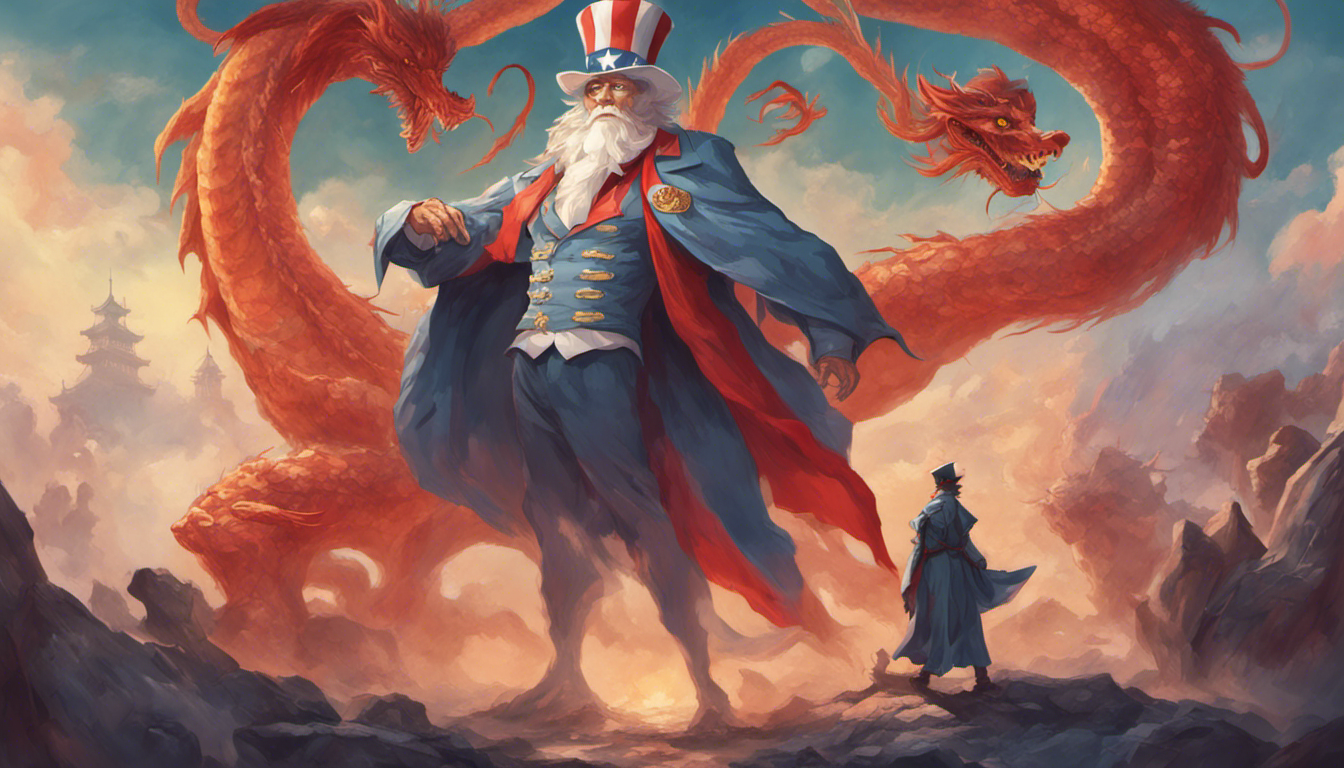US bans investment in China

Are you new here? Get free emails to your inbox.
Hi this is ZipLaw! The newsletter that's as addictive as hitting the 'next episode' on your favourite Netflix series.
It’s Friday team, let’s get it:
- US bans investment in China 🇺🇸
- China is in deflation mode
- AI Music is coming 🤖
- Law Firm application deadlines ⏲️
P.S. Keep an eye out and click the scales emoji (⚖️) hidden somewhere in today’s email for a free entry into our giveaway!
Additionally, you’ll get another free entry for every subscriber who joins our newsletter using your unique link: #
You can track how many referrals you’ve made . Happy hunting!
US bans investment in China 🇺🇸
Oh boy, did things just get spicy in the tech world or what?
Biden whipped out his pen and paper and threw a curveball to China by blocking investments in their tech sectors.
And China ain’t too happy about it.
Here’s all you need to know.

What did the US ban and why?
Imagine China's tech sectors as a buffet, and Biden's just slapped a "Do Not Eat" sign on some of the juiciest dishes.
Specifically, the U.S. is banning investments in China's quantum computing, advanced chips, and AI.
Why? Biden fears these technologies might allow China to develop advanced military applications, such as sophisticated weaponry or cyber capabilities, that could potentially challenge or even threaten U.S. security interests.
More broadly, it’s part of the US’ strategy to curb China's technological advancements in areas that might make it too powerful and where the US wants to retain a leading global position.
What was China's response?
China is obviously not happy about this and said the ban deviates from the principles of fair competition.
Meanwhile, in a frenzy that might rival Black Friday shoppers, China's internet giants are gobbling up Nvidia's A800 chips like hotcakes to boost their production capabilities.
These chips, vital for building AI systems, are being stockpiled to the tune of $5 billion.

What about the UK and the EU?
The UK's response? A tantalizing "Hmm, let's think about this." It's a balancing act of wanting to maintain trade-friendly ties with China without putting national security at risk.
Meanwhile, the EU will analyse the U.S. move and propose their own initiative by year-end. Let's just say they're cooking something up, but the dish isn't ready yet.
⚖️ How does this impact Law Firms?
International Trade and Compliance:
- Compliance Checks: Lawyers specialising in international trade laws will have to assist businesses in understanding the new executive order, ensuring that any ongoing or planned investments comply with the new restrictions. If you were planning on tucking into China's tech buffet, you'd better check if your fork's legal!
- Export Control Guidance: Given the Chinese rush for Nvidia's chips, expect UK law firms to guide tech companies through the complex maze of export controls and regulations. If you're exporting chips, better make sure you're not inadvertently seasoning China's secret sauce.
Intellectual Property and Technology:
- Intellectual Property Protection: The ban could lead to increased attempts at technology theft or espionage. IP lawyers will be busy advising companies on how to protect their intellectual properties in both domestic and international markets.
- Technology Transactions and Licensing: As companies pivot away from the banned sectors, they'll need guidance on legal agreements involving technology transactions, development, and licensing. It's like swapping out ingredients in the recipe, but each ingredient comes with a 50-page legal contract.
Corporate Mergers and Acquisitions (M&A):
- Due Diligence in Tech M&A: As the ban impacts China's tech landscape, lawyers will be involved in the increased scrutiny and due diligence of potential mergers and acquisitions within the sector. If you're thinking about mixing tech recipes with a Chinese firm, legal experts will be needed to taste-test the deal.
- Advising on Strategic Alternatives: The U.S. ban might prompt firms to seek alternative partnerships and investments. M&A lawyers will be advising on the legalities of these strategic alternatives to ensure it’s all compliant.
- National Security Assessments: Legal teams will be needed to assist with national security assessments regarding specific technologies and investments. They'll be the ones deciding if the tech casserole has too much "national security risk" pepper.
China’s in deflation mode 🇨🇳
China's economic landscape confronts an unforeseen challenge as it grapples with deflation; a persistent decline in the overall prices of goods and services.
Once a growth engine, China now stands at a crossroads, seeking solutions to counter this deflationary pressure and reignite economic vitality.

Falling Consumer Prices:
China's consumer price index plummeted by an unprecedented 0.3% YoY in July, intensifying policymakers' efforts to revive consumer spending. The producer price index, reflecting factory gate prices, echoes this with a substantial 4.4% drop in July.
Stimulus Scenario: Awaiting Action
As deflation's drama unfolds, the call for more government stimulus becomes louder.
Amid a sluggish property sector, trade vulnerabilities, and stumbling economic momentum, the descent into deflation amplifies concerns and rejuvenates discussions about the government's role in restoring economic equilibrium.
Experts warn the Chinese economy is at serious risk of sliding into a deflationary episode that could spark a downward spiral in the private sector’s confidence.
Economic Reform: Treading a Precarious Path
China's unique approach—prioritising a three-year zero-Covid policy—sets it apart from global inflation trends.
Some confidence returned as targeted rate cuts and tax incentives resonated, albeit without grand-scale stimulus.
Policymakers are now under pressure to resurrect momentum, dispel deflation, and guide the nation back into an economic crescendo.
⚖️ How does this impact Law Firms?

International Trade and Investment: Global Ramifications
The ripple effects of China's deflation extend beyond its borders, impacting international trade and investment. International trade lawyers monitor the intricate dynamics of global trade agreements in light of deflation's potential influence on China's export-import landscape. Investment law experts assess the implications for foreign investments in China and Chinese investments abroad, navigating a legal tapestry woven with international economic considerations.⚖️
Bankruptcy and Restructuring: Weathering Economic Storms
Deflation's economic challenges can manifest in bankruptcy and financial distress scenarios. Bankruptcy and restructuring attorneys may see an uptick in cases as businesses grapple with financial pressures stemming from deflationary forces. These legal professionals play a vital role in guiding businesses through the intricacies of debt restructuring and financial recovery in a deflation-tinged environment.
AI Music is coming 🤖
Ever wanted to create some fresh music using the voices of your favourite artists?
Turns out that may soon be possible.
That's right: Google and Universal Music are flirting with the idea of making artificial intelligence your next favorite cover artist.

So, how's it going to work? Picture an AI karaoke machine that takes requests. Google and the big labels are planning a tool that lets fans mix famous voices into new songs, all while paying the original artists a percentage.
But not everyone's singing the praises of this new-age melody-maker. Drake called AI mimicry of his voice "the final straw" while others, like Grimes, are all about living forever through digital echoes of their tunes.
The boom in AI content is a huge area for legal work. Here’s our thoughts on what this means for law firms.
IP:
- Licensing Agreements: IP lawyers will be central in drafting and negotiating licensing agreements between tech companies like Google and music labels such as Universal Music. These agreements will lay down the specific terms under which artists' melodies and voices can be used by AI, ensuring compliance with copyright laws.
- Infringement Actions: There will likely be a rise in copyright infringement cases, as artists or labels discover unauthorized use of their work in AI-generated music. IP lawyers will be engaged to either prosecute or defend these infringement claims, a complex task considering the novel nature of AI involvement.
Commercial and Data Protection:
- Data Privacy Compliance: Tech lawyers will need to assess and ensure that the data used to train AI models (such as artists' voices) complies with data protection laws. They may also need to draft terms and conditions for users of AI-generated music platforms to ensure proper consent and compliance with privacy regulations.
- Artist Contracts and Consent: Entertainment lawyers will be involved in drafting and negotiating contracts with individual artists who choose to opt-in. These agreements will outline the terms under which their voices or melodies can be used by AI, including royalty arrangements and consent clauses.
Fresh Start Friday ⭐️
It’s the end of the week (yay!) but it could also be the start of your next big career adventure.
Here’s our super briefing on the top job deadlines expiring soon!
- 5 Stone Buildings - Mini-Pupillage (15 August 2023)
- 11KBW - Mini-Pupillage (30 September 2023)
- Herbert Smith Freehills - Winter Vacation Scheme (29 September 2023)
- Milbank - Spring Vacation Scheme (1 October 2023)
- Slaughter and May - Winter Vacation Scheme (13 October 2023)
👀 ZIPMEMES






